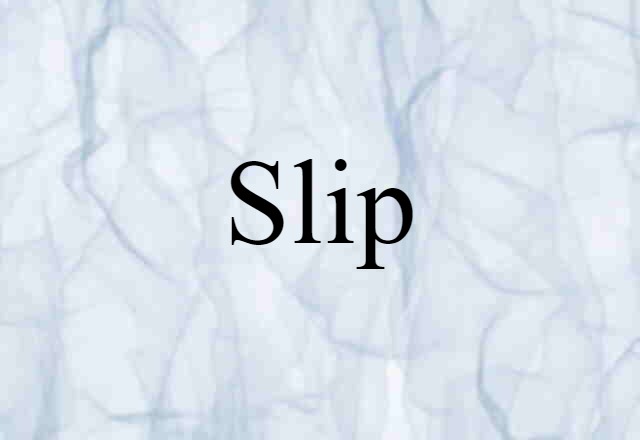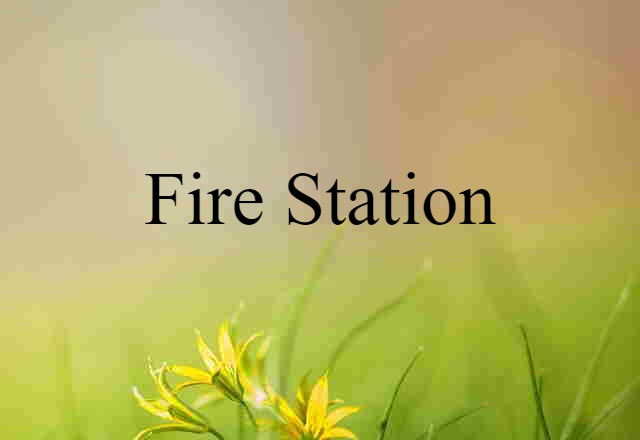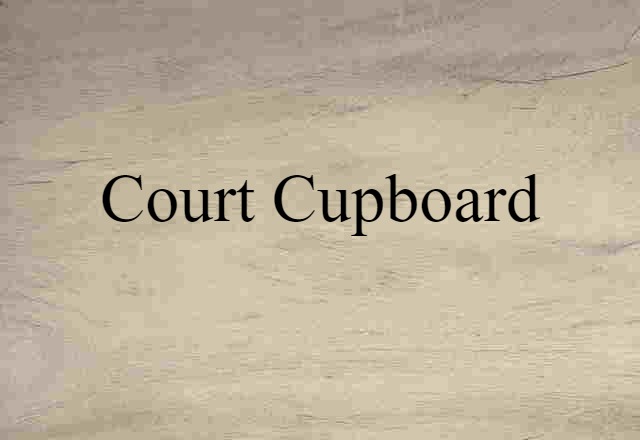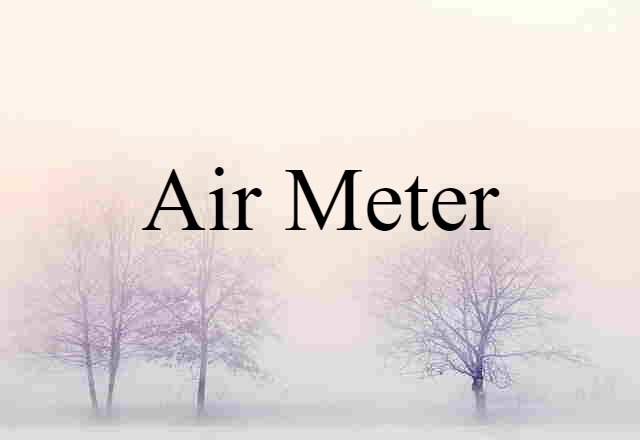- to move, flow, pass, or go smoothly or easily; glide; slide: Water slips off a smooth surface.
- to slide suddenly or involuntarily; to lose one's foothold, as on a smooth surface: She slipped on the icy ground.
- to move, slide, or start gradually from a place or position: His hat had slipped over his eyes.
- to slide out of or become disengaged from a fastening, the grasp, etc.: The soap slipped from my hand.
- to pass without having been acted upon or used; be lost; get away: to let an opportunity slip.
- to pass from the mind, memory, or consciousness.
- to elapse or pass quickly or imperceptibly (often followed by away or by): The years slipped by.
- to become involved or absorbed easily: to slip into a new way of life.
- to move or go quietly, cautiously, or unobtrusively: to slip out of a room.
- to put on or take off a garment easily or quickly: She slipped on the new sweater. He slipped off his shoes.
- to make a mistake or error: As far as I know, you haven't slipped once.
- to fall below a standard or accustomed level, or to decrease in quantity or quality; decline; deteriorate: His work slipped last year.
- to be said or revealed inadvertently (usually followed by out): The words just slipped out.
- to read, study, consider, etc., without attention: He slipped over the most important part.
- (of an aircraft when excessively banked) to slide sideways, toward the center of the curve described in turning.
- to cause to move, pass, go, etc., with a smooth, easy, or sliding motion.
- to put, place, pass, insert, or withdraw quickly or stealthily: to slip a letter into a person's hand.
- to put on or take off (a garment) easily or quickly: He slipped the shirt over his head.
- to let or make (something) slide out of a fastening, the hold, etc.: I slipped the lock, and the door creaked open.
- to release from a leash, harness, etc., as a hound or a hawk.
- to get away or free oneself from; escape (a pursuer, restraint, leash, etc.): The cow slipped its halter.
- to untie or undo (a knot).
- to let go entirely, as an anchor cable or an anchor.
- to pass from or escape (one's memory, attention, knowledge, etc.).
- to dislocate; put out of joint or position: I slipped a disk in my back.
- to shed or cast: The rattlesnake slipped its skin.
- to ignore, pass over, or omit, as in speaking or writing.
- to let pass unheeded; neglect or miss.
- to evade or avoid (a blow) by moving or turning the body quickly: He slipped a right and countered with a hard left.
- (of animals) to bring forth (offspring) prematurely.
- to detach (a railway car) from a moving train as it passes through a station.
- an act or instance of slipping.
- a sudden losing of one's foothold, as on slippery ground.
- a mistake in judgment; blunder.
- a mistake or oversight, as in speaking or writing, especially a small one due to carelessness: a minor slip in addition; a slip of the tongue; a slip of the pen.
- an error in conduct; indiscretion.
- something easily slipped on or off.
- a decline or fall in quantity, quality, extent, etc., or from a standard or accustomed level: a slip in prices.
- Clothing.
- a woman's undergarment, sleeveless and usually having shoulder straps, extending from above the bust down to the hemline of the outer dress.
- an underskirt, as a half-slip or petticoat.
- a pillowcase.
- an inclined plane, sloping to the water, on which vessels are built or repaired.
- the difference between the speed at which a screw propeller or paddle wheel would move if it were working against a solid and the actual speed at which it advances through the water.
- a space between two wharves or in a dock for vessels to lie in.
- the difference between the synchronous and the operating speeds of a motor.
- Machinery.
- the difference between output speed and input or theoretical speed in certain fluid or electromagnetic devices, as couplings or motors.
- (in pumps) the difference between the actual volume of water or other liquid delivered by a pump during one complete stroke and the theoretical volume as determined by calculation of the displacement.
- unintended movement or play between mechanical parts or the like.
- Cricket.
- the position of a fielder who stands behind and to the offside of the wicketkeeper.
- the fielder playing this position.
- Geology.
- the relative displacement of formerly adjacent points on opposite sides of a fault, measured along the fault plane.
- a small fault.
- plastic deformation of one part of a metallic crystal relative to the other part due to shearing action.
- slip away,
- to depart quietly or unobtrusively; steal off.
- to recede; slowly vanish: All those facts I had memorized just slipped away.
- to make an error; fail: I slipped up and put the letter in the wrong envelope.
- to elude a pursuer; escape: The murderer gave the police the slip.
- to reveal unintentionally: to let slip the truth.
- cog1 (def. 6).
- crack (def. 53).
- to be forgotten: I was supposed to phone, but it slipped my mind.
- to deceive; defraud; trick.
- a small paper form on which information is noted: a withdrawal slip.
- a piece suitable for propagation cut from a plant; scion or cutting.
- any long, narrow piece or strip, as of wood, paper, or land.
- a young person, especially one of slender form: a mere slip of a girl.
- a long seat or narrow pew in a church.
- one of the ends of a band, extending at the sides of a book after sewing.
- to take slips or cuttings from (a plant).
- to take (a part), as a slip from a plant.
- a clay solution of creamy consistency for coating or decorating biscuit.
- a glass-bearing liquid fired onto steel as a cladding, as in making enamelware.
- a variant of slype.
- to move or cause to move smoothly and easily
- to place, insert, or convey quickly or stealthily
- to put on or take off easily or quickly
- to lose balance and slide unexpectedly
- to let loose or be let loose
- to be released from (something); escape
- to let go (mooring or anchor lines) over the side
- to pass out of (the mind or memory)
- to overlook, neglect, or miss
- to move or pass swiftly or unperceived
- to make a mistake
- to cause (an aircraft) to slide sideways or (of an aircraft) to slide sideways
- to decline in health, mental ability, etc
- (of an intervertebral disc) to become displaced from the normal position
- to dislocate (a bone)
- (of animals) to give birth to (offspring) prematurely
- to pass (a stitch) from one needle to another without knitting it
- to operate (the clutch of a motor vehicle) so that it partially disengages
- (of the clutch of a motor vehicle) to fail to engage, esp as a result of wear
- let slip
- to allow to escape
- to say unintentionally
- to hoodwink or trick
- the act or an instance of slipping
- a mistake or oversight
- a moral lapse or failing
- a woman's sleeveless undergarment, worn as a lining for and to give support to a dress
- a narrow space between two piers in which vessels may dock
- See slipway
- a kind of dog lead that allows for the quick release of the dog
- a small block of hard steel of known thickness used for measurement, usually forming one of a set
- the ratio between output speed and input speed of a transmission device when subtracted from unity, esp of a drive belt or clutch that is not transmitting full power
- cricket
- the position of the fielder who stands a little way behind and to the offside of the wicketkeeper
- the fielder himself
- the relative movement of rocks along a fault plane
- a landslide, esp one blocking a road or railway line
- the deformation of a metallic crystal caused when one part glides over another part along a plane
- the deviation of a propeller from its helical path through a fluid, expressed as the difference between its actual forward motion and its theoretical forward motion in one revolution
- another name for sideslip (def. 1)
- to elude or escape from someone
- a narrow piece; strip
- a small piece of paper
- a part of a plant that, when detached from the parent, will grow into a new plant; cutting; scion
- a young slender person
- a young pig
- printing
- a long galley
- a less common name for a galley proof
- a pew or similar long narrow seat
- a small piece of abrasive material of tapering section used in honing
- to detach (portions of stem, etc) from (a plant) for propagation
- clay mixed with water to a creamy consistency, used for decorating or patching a ceramic piece
















